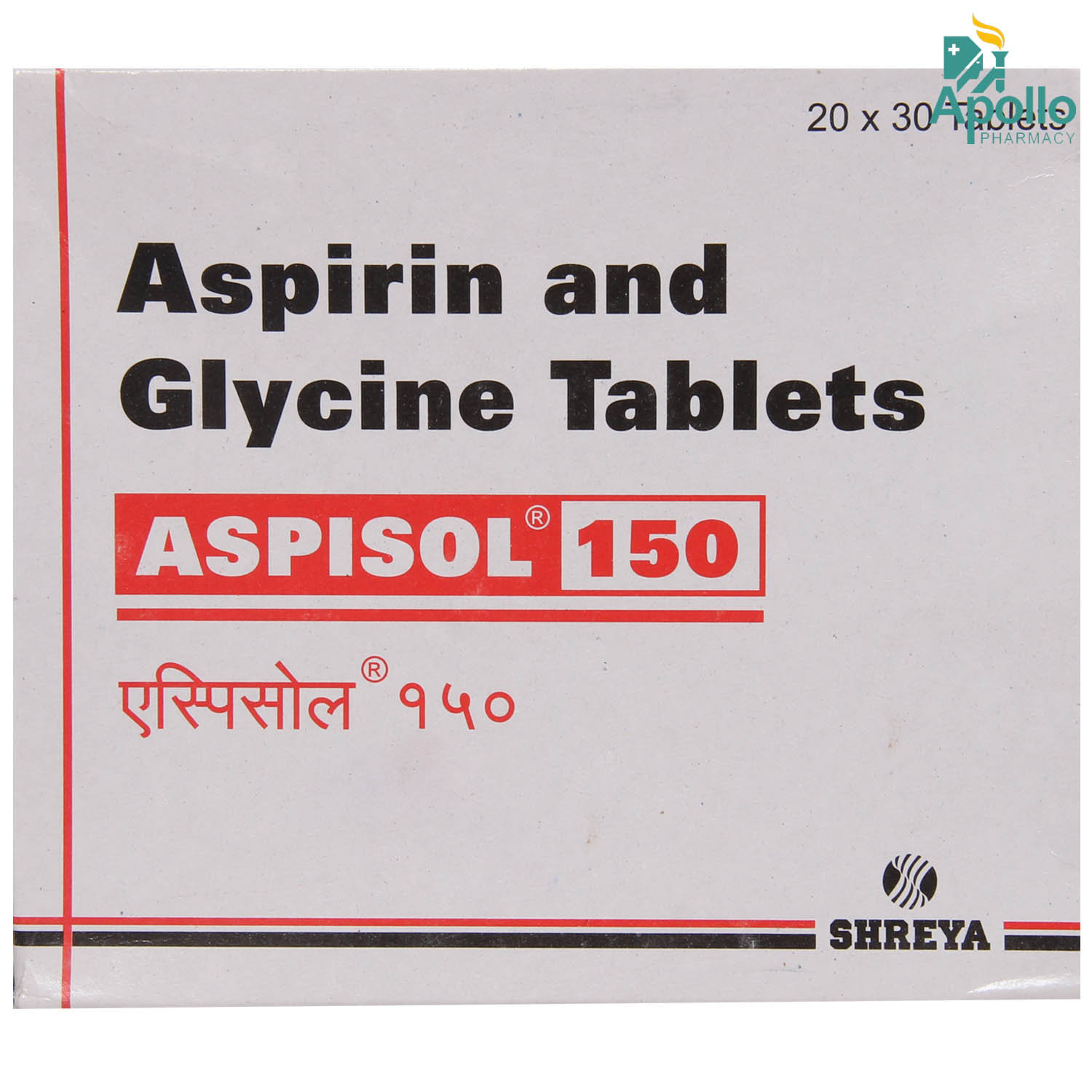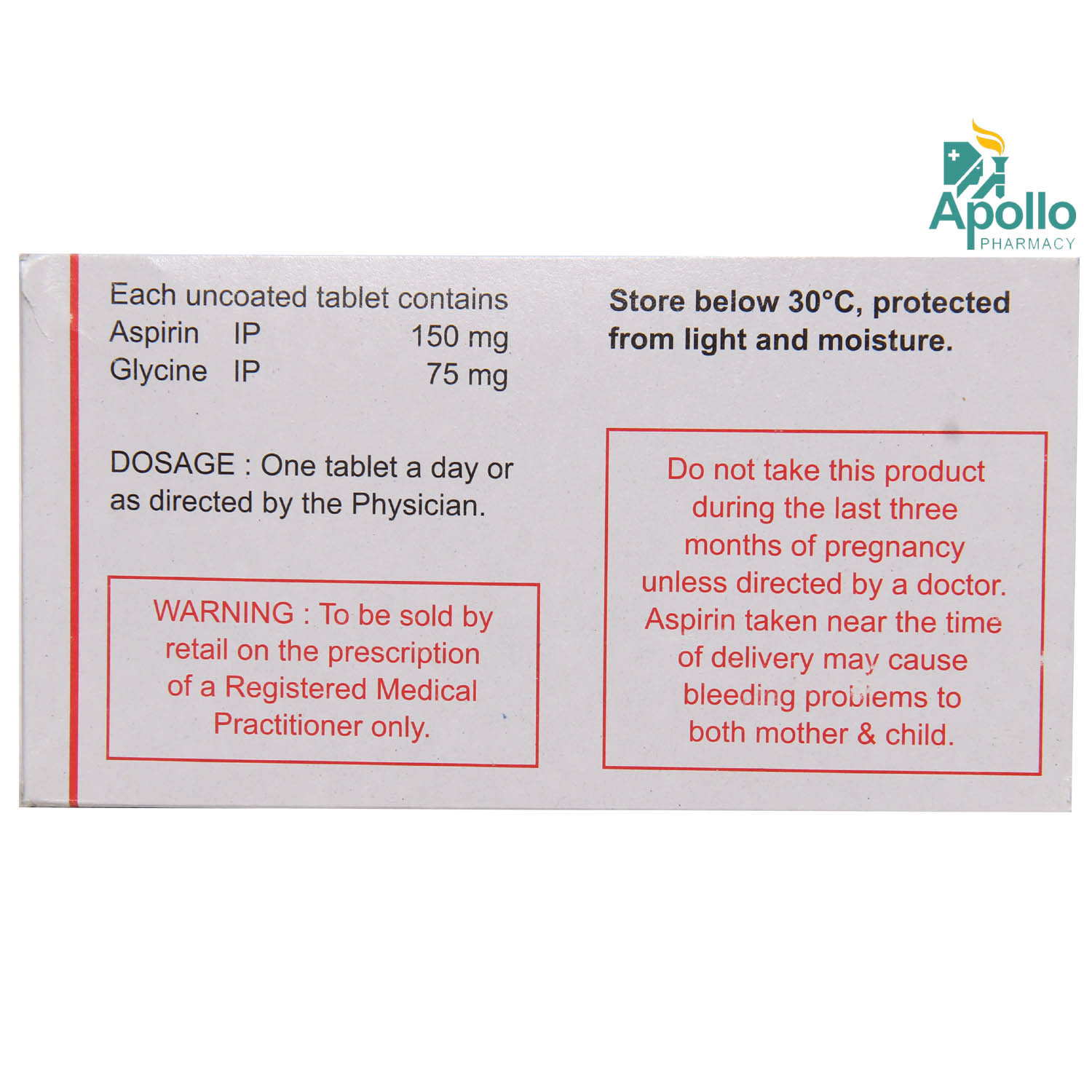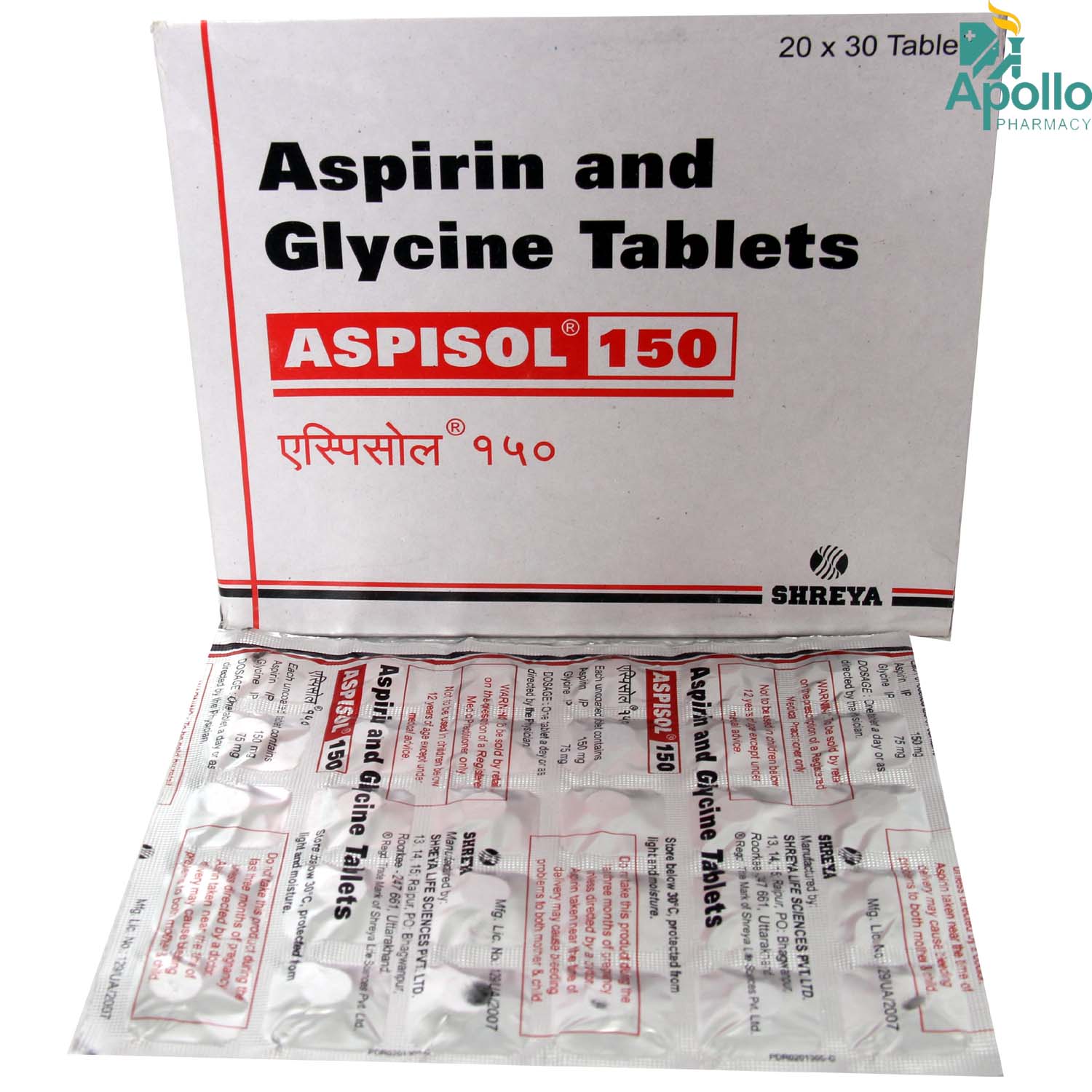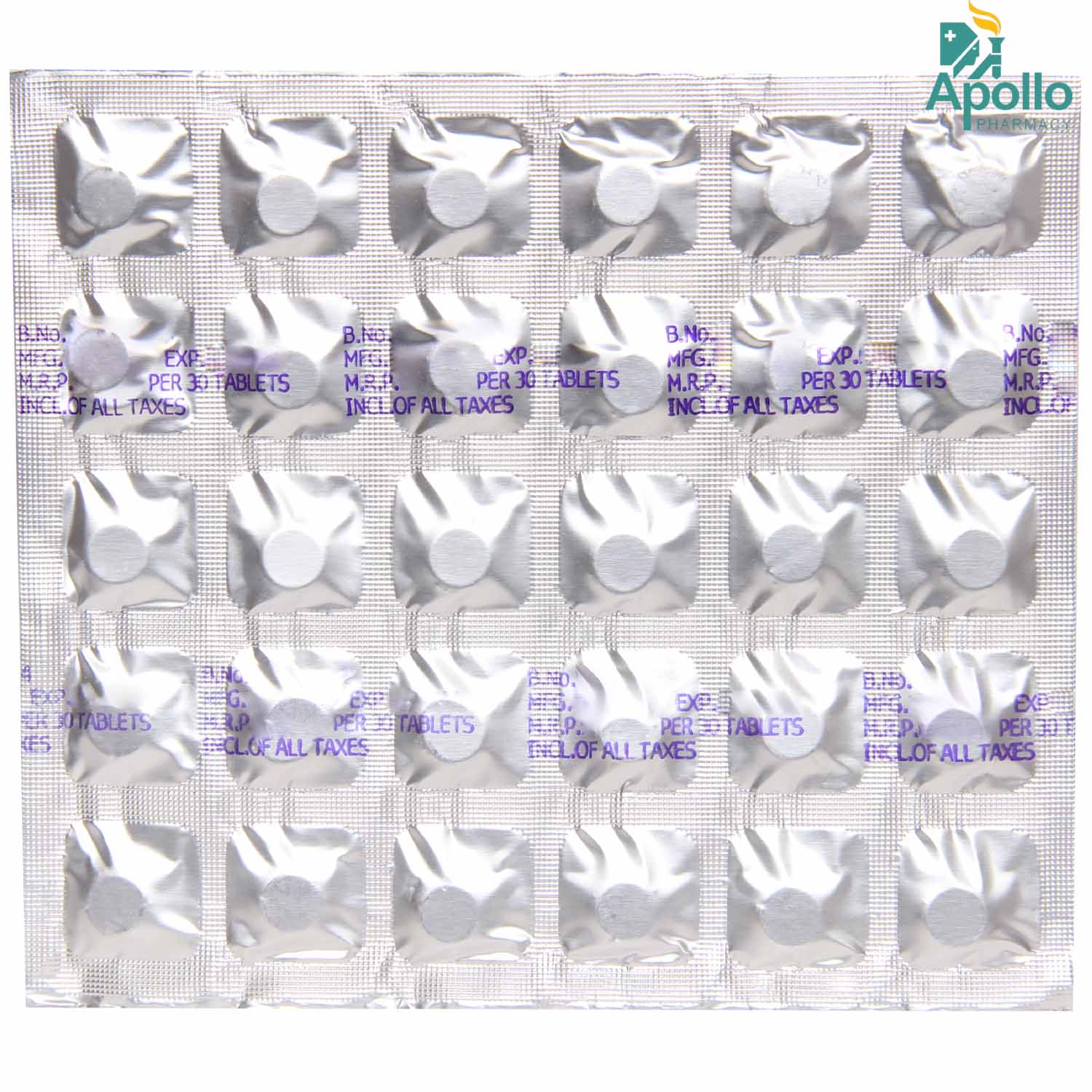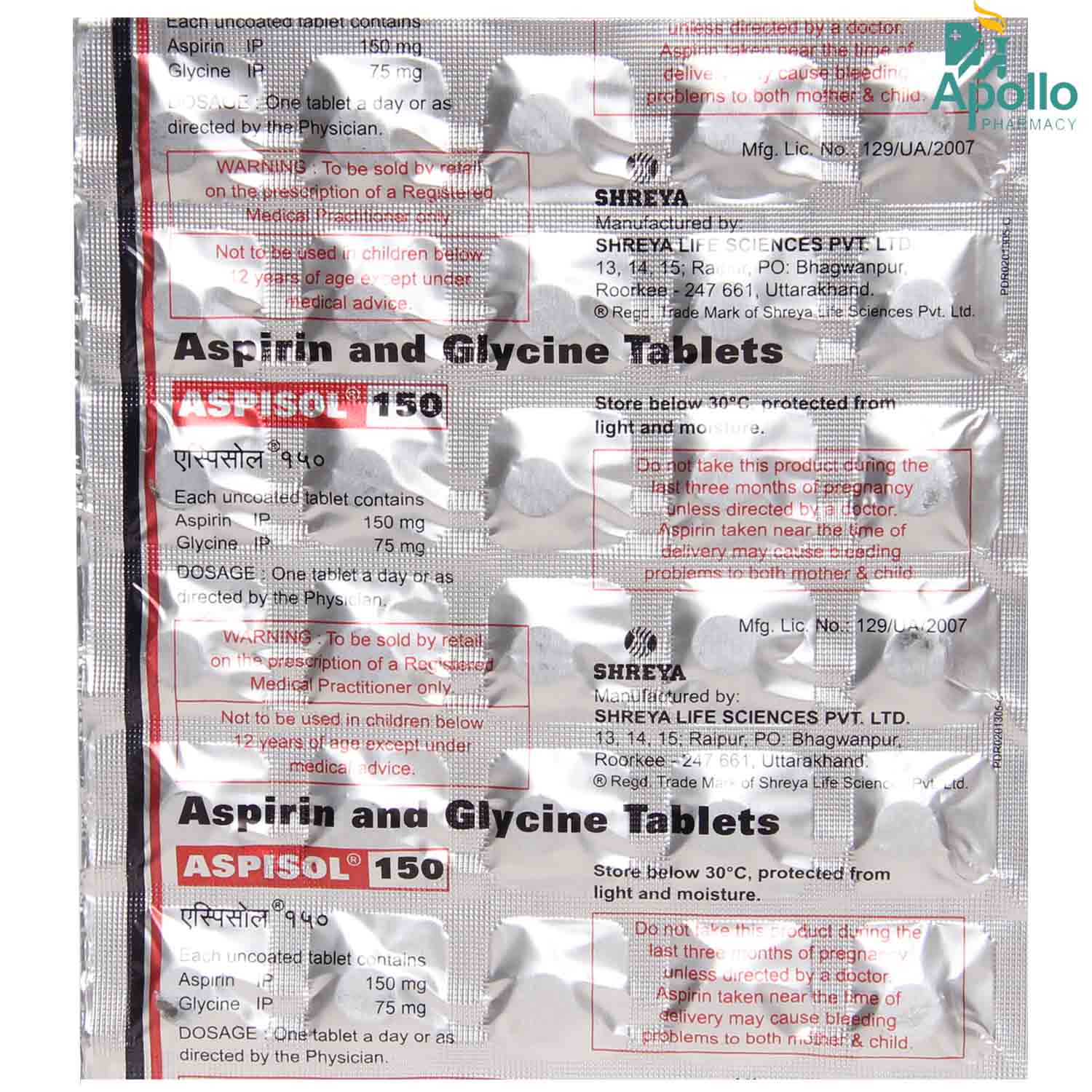Aspisol 150 mg Tablet 30's
MRP ₹15.5
(Inclusive of all Taxes)
₹2.3 Cashback (15%)
Provide Delivery Location
Online payment accepted
 Prescription drug
Prescription drugWhats That
Composition :
Manufacturer/Marketer :
Consume Type :
Expires on or after :
Return Policy :
About Aspisol 150 mg Tablet
Aspisol 150 mg Tablet belongs to the group of antiplatelet agents used for the prevention of stroke and heart attack which occur due to a cessation of blood supply. Heart attack/myocardial infarction is a condition in which the heart does not receive an adequate level of blood supply due to the formation of clots along the way which prevents the free flow of blood. A stroke is an interruption to the blood supply reaching the brain, thereby preventing brain tissue from receiving enough oxygen and nutrients.
Aspisol 150 mg Tablet contains ‘’Aspirin and Glycine.’’ Aspirin helps in dissolving clots, which are formed by the clumping together of blood cells called platelets. It helps in reducing the risk of blood clot formation, thereby ensuring seamless and free flow of blood. Glycine, an amino acid helps prevent damage to the stomach lining and acid build-up, thereby lowering the harmful effects of aspirin. Together, Aspisol 150 mg Tablet helps prevent heart attack and stroke.
Aspisol 150 mg Tablet is a prescription-only medicine. It may be taken with or without food. Aspisol 150 mg Tablet should be swallowed whole with a glass of water. Do not crush, chew or break it. In some cases, Aspisol 150 mg Tablet may cause certain common side effects such as diarrhoea, indigestion, easy bleeding and bruising. Most of these side effects do not require medical attention and will resolve gradually over time. However, you are advised to talk to your doctor if these side effects persist.
Keep your doctor informed if you have recently had any surgery. Inform the doctor if you are on antihypertensive, hormonal, anti-diabetes, diuretic, steroid, immunosuppressant, antacid, blood thinner, anti-inflammatory, anti-glaucoma, chemotherapy or mental health therapy. Consult your doctor before taking Aspisol 150 mg Tablet during pregnancy or if you are breastfeeding. Talk to your doctor before taking alcohol with Aspisol 150 mg Tablet . Drive with caution as Aspisol 150 mg Tablet may cause decreased alertness.
Uses of Aspisol 150 mg Tablet
Directions for Use
Key Benefits
Aspisol 150 mg Tablet is a combination drug that works as an anti-platelet and helps in dissolving blood clots, thereby easing the free flow of blood. It hence finds application in disorders that occur due to an interruption of blood supply, like heart attack, stroke and angina. Aspisol 150 mg Tablet contains Aspirin and Glycine. Aspirin inhibits the cyclooxygenase enzyme (COX enzyme). COX is responsible for catalysing the formation of inflammatory mediators called prostaglandins, and clotting agents called thromboxanes. By inhibiting COX, aspirin suppresses the formation of clotting agents thromboxanes, which would otherwise lead to blood clots. Thereby, aspirin works as a potential blood-thinner, helping blood flow normally and in a fluid manner. Glycine is an essential aminoacid, which has a cardioprotective role. It helps in building the health of cardiac tissue and in enhancing remodelling. It also protects the heart from pressure overload. Thus, Aspisol 150 mg Tablet finds widespread application in the prevention of heart attack, stroke and angina.
Storage
Drug Warnings
Do not use Aspisol 150 mg Tablet if you are allergic to Aspisol 150 mg Tablet , to NSAID’s or any of the components of Aspisol 150 mg Tablet . Keep your doctor informed if you suffer from any bleeding disorders, asthma, peptic ulcers, diabetes, hypertension, cardiovascular disorders, kidney disease, liver disease, rheumatoid arthritis, anaemia, menorrhagia, gout, nasal polyps (growths in the nose) and or unusual swellings anywhere in the body. Inform your doctor if you have recently had any surgery. Offer a detailed medical history and inform the doctor if you’ve ever had a heart attack or stroke. Inform the doctor if you are on antihypertensive, hormonal, anti-diabetes, diuretic, steroid, immunosuppressant, antacid, blood thinner, anti-inflammatory, anti-glaucoma, chemotherapy or mental health therapy. Consult your doctor if you are pregnant or breastfeeding. Talk to your doctor before taking alcohol with Aspisol 150 mg Tablet .
Drug-Drug Interactions
Drug-Drug Interactions
Login/Sign Up
Co-administration of Ketorolac and Aspisol 150 mg Tablet may increase the risk of side effects.
How to manage the interaction:
Taking Ketorolac with Aspisol 150 mg Tablet is not recommended but can be taken together if prescribed by a doctor. However, consult a doctor if you experience unusual bleeding or bruising, dizziness, tarry stools, coughing up or vomiting fresh or dried blood, severe headache and weakness. Do not stop using any medications without talking to a doctor.
Combining Ketorolac tromethamine with Aspisol 150 mg Tablet can increase the risk of adverse effects.
How to manage the interaction:
Taking Aspisol 150 mg Tablet with Ketorolac tromethamine is not recommended, as it results in an interaction, it can be taken if advised by a doctor. Do not stop using any medications without a doctor’s advice.
The use of panobinostat with Aspisol 150 mg Tablet may increase the risk of bleeding.
How to manage the interaction:
Taking panobinostat with Aspisol 150 mg Tablet together can possibly result in an interaction, but it can be taken if your doctor has advised it. However, if you experience unusual bleeding or bruising, dizziness, lightheadedness, red or black, tarry stools, coughing up or vomiting fresh or dried blood that looks like coffee grounds, severe headache, and weakness, consult the doctor. Do not stop using any medications without a doctor's advice.
Using warfarin together with Dicoumarol may cause you to bleed more easily.
How to manage the interaction:
Taking Aspisol 150 mg Tablet with Dicoumarol together can result in an interaction, but it can be taken if a doctor has advised it. If you notice any bleeding, it's important to contact a doctor right away. They will be able to help you and provide the necessary care. Do not discontinue any medications without consulting a doctor.
Coadministration of Aspisol 150 mg Tablet and Teriflunomide can enhance the risk of liver problems.
How to manage the interaction:
Although co-administration of Aspisol 150 mg Tablet with teriflunomide can lead to an interaction, it can be taken if recommended by a doctor. If you experience fever, chills, joint pain or swelling, unusual bleeding or bruising, skin rash, itching, loss of appetite, fatigue, nausea, vomiting, abdominal pain, dark colored urine, light colored stools, and/or yellowing of the skin or eyes, contact a doctor right away. Do not discontinue any medications without consulting a doctor.
Using Aspisol 150 mg Tablet together with deflazacort may increase the risk of gastric and intestinal ulcers, bleeding and perforation.
How to manage the interaction:
Co-administration of Aspisol 150 mg Tablet with Deflazacort can result in an interaction, but it can be taken if a doctor has advised it. If you have any symptoms unusual bleeding or bruising, dizziness, lightheadedness, red or black, tarry stools, coughing up or vomiting fresh or dried blood that looks like coffee grounds, severe headache, and weakness, consult a doctor. Do not stop using any medications without consulting a doctor.
Using Aspisol 150 mg Tablet together with tirofiban can cause you to bleed more easily.
How to manage the interaction:
Co-administration of Aspisol 150 mg Tablet with Tirofiban can result in an interaction, but it can be taken if a doctor has advised it. If you notice any of these signs, it's important to contact a doctor right away: bleeding, bruising, throwing up, headache, feeling dizzy, weakness, or seeing blood in your urine or stools. Do not stop using any medications without talking to a doctor.
Co-administration of Aspisol 150 mg Tablet and Rivaroxaban can increase the risk of unusual bleeding.
How to manage the interaction:
Although Co-administration of Aspisol 150 mg Tablet and Rivaroxaban can lead to an interaction, they can be taken together if advised by a doctor. However, if you experience unusual bleeding or bruising, dizziness, lightheadedness, red or black, tarry stools, coughing up or vomiting fresh or dried blood that looks like coffee grounds, severe headache, and weakness, consult the doctor. Do not stop using any medications without a doctor's advice.
Coadministration of Aspisol 150 mg Tablet and leflunomide can increase the risk of liver problems.
How to manage the interaction:
Although there is an interaction between Aspisol 150 mg Tablet and leflunomide, they can be taken together if prescribed by a doctor. However, consult a doctor if you experience fever, chills, joint pain or swelling, unusual bleeding or bruising, skin rash, itching, less desire to eat, fatigue, nausea, vomiting, abdominal pain, and/or yellowing of the skin or eyes. Do not discontinue any medications without consulting a doctor.
Taking fondaparinux with Aspisol 150 mg Tablet can increase the risk of bleeding leading to serious blood loss.
How to manage the interaction:
Although there is an interaction between fondaparinux and Aspisol 150 mg Tablet, they can be taken together if prescribed by a doctor. However, consult a doctor if you experience bleeding, severe back pain, dizziness, black or red stools, severe headache, weakness, and vomiting. Do not stop using any medications without talking to a doctor.
Drug-Food Interactions
Drug-Food Interactions
Login/Sign Up
Diet & Lifestyle Advise
- Reducing weight and having a healthy BMI is very important in enhancing cardiac health.
- 30 minutes of daily physical exercise can go a long way in preventing heart disease.
- Avoid smoking to improve cardiac health.
- Invest in a healthy, balanced diet. Avoid fatty foods, keep your cholesterol in check and load up on the green leafy vegetables, fish, lean meats, nuts and dry fruits.
- Reducing stress is very important in keeping a healthy heart. Try yoga and meditation for a relaxed state of mind.
Side Effects of Aspisol 150 mg Tablet
- Nausea
- Indigestion
- Diarrhoea
- Increased tendency for bleeding
- Feeling sick
- Hives
Habit Forming
Therapeutic Class
All Substitutes & Brand Comparisons
Drug-Diseases Interactions
Drug-Diseases Interactions
Login/Sign Up
FAQs
Drug-Drug Interactions Checker List
- CICLOSPORIN
- TACROLIMUS
- FUROSEMIDE
- CLOZAPINE
- HEPARIN
- WARFARIN
- CLOPIDOGREL
- PHENINDIONE
- LITHIUM
- METHOTREXATE
- INDINAVIR
- RITONAVIR
- NELFINAVIR
- ATAZANAVIR
- DARUNAVIR
- DIGITOXIN
- AMIODARONE
- VERAPAMIL
- IBUPROFEN
- VALPROATE
- PHENYTOIN
- GLIBENCLAMIDE
- PROBENECID
- ACETAZOLAMIDE
Special Advise
- Take Aspisol 150 mg Tablet exactly as prescribed.
- In case you miss a dose of Aspisol 150 mg Tablet , talk to your physician. Never take a double dose.
- Do not discontinue taking Aspisol 150 mg Tablet abruptly or without the advice of the physician.
- Please know that your doctor may order blood tests to check your hormone levels while you are on Aspisol 150 mg Tablet .
- Your doctor may order a D-dimer to check your clotting profile while on Aspisol 150 mg Tablet .
- Your doctor may order liver function tests (LFT’s) and a complete blood picture (CBP) to ascertain the effects of Aspisol 150 mg Tablet .
Disease/Condition Glossary
Heart Attack: A heart attack (called myocardial infarction) is a serious medical emergency in which blood supply to the heart is interrupted, usually by a blood clot that forms along the way. Symptoms of a heart attack include chest pain, jaw pain, pain on the left side of the body, nausea, dizziness, sweating, a feeling of impending doom etc.
Stroke: A stroke is an interruption of blood supply to the brain, leading to a lack of oxygen and nutrients received by the brain. A stroke is a medical emergency. Trouble walking, difficulty in understanding speech and in speaking, numbness of the limbs and dizziness are some symptoms of a stroke.

Have a query?
Alcohol
Safe if prescribed
Avoid taking alcohol with Aspisol 150 mg Tablet as it may increase the risk of intestinal bleeding. Consult your doctor if you have any concerns.
Pregnancy
Consult your doctor
Aspisol 150 mg Tablet is not recommended for use during pregnancy, especially during the last three months. Consult your doctor if you have any concerns.
Breast Feeding
Consult your doctor
Aspisol 150 mg Tablet should be used with caution during breastfeeding. Consult your doctor if you have any concerns.
Driving
Safe if prescribed
Drive or operate machinery with caution as Aspisol 150 mg Tablet may cause decreased alertness.
Liver
Consult your doctor
Aspisol 150 mg Tablet should be used with caution in those with pre-existing liver disease. Please consult your doctor in case of any concerns.
Kidney
Consult your doctor
Aspisol 150 mg Tablet should be used with utmost caution in those with pre-existing kidney disease. Please consult your doctor in case of any concerns.
Children
Safe if prescribed
Aspisol 150 mg Tablet is unsafe to use in children under 12 years of age. Please consult your physician if you have any concerns.

